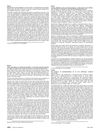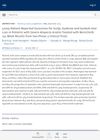20 citations,
December 2021 in “Plants” Tamarix aphylla may be effective for various medical conditions, but more research is needed to confirm its safety and effectiveness.
 18 citations,
March 2022 in “Drug design, development and therapy”
18 citations,
March 2022 in “Drug design, development and therapy” Platelet-rich plasma (PRP) may help with various hair loss types, but more research is needed to find the best use method.
 November 2024 in “Pharmaceutics”
November 2024 in “Pharmaceutics” Transfersomes are better than liposomes for targeting hair follicles in alopecia treatment.
 January 2024 in “Biotechnology advances”
January 2024 in “Biotechnology advances” Bioassays help find useful compounds in nature for making medicines, supplements, and cosmetics.
25 citations,
March 2017 in “International Journal of Dermatology” Ruxolitinib effectively and safely regrows hair in alopecia patients.
 4 citations,
March 2023 in “Current Oncology”
4 citations,
March 2023 in “Current Oncology” Scalp cooling is the only FDA-approved method to prevent hair loss from chemotherapy, but other treatments like minoxidil and PRP are being tested.
 13 citations,
November 2021 in “Biomedicines”
13 citations,
November 2021 in “Biomedicines” Plasma-activated liquid can kill harmful cells, speed up wound healing, and potentially treat cancer without damaging healthy cells.
 1 citations,
April 2023 in “Science Advances”
1 citations,
April 2023 in “Science Advances” High levels of ERK activity are key for tissue regeneration in spiny mice, and activating ERK can potentially redirect scar-forming healing towards regenerative healing in mammals.
1 citations,
October 2022 in “Evidence-based Complementary and Alternative Medicine” Traditional Chinese Medicine may help treat hair loss but needs more research.
 March 2024 in “EMBO molecular medicine”
March 2024 in “EMBO molecular medicine” Antiviral drugs, especially daclatasvir, may be a new treatment for a rare skin disease, improving survival and reducing symptoms in mice.
21 citations,
April 2018 in “The Journal of urology/The journal of urology” SER120 nasal spray effectively reduces nighttime urination and is safe for patients.
 March 2014 in “Journal of The American Academy of Dermatology”
March 2014 in “Journal of The American Academy of Dermatology” Tavaborole is a safe and effective toenail fungus treatment, with the 5% solution being the best option.
 September 2022 in “Journal of The American Academy of Dermatology”
September 2022 in “Journal of The American Academy of Dermatology” Baricitinib was effective in regrowing eyebrow and eyelash hair in patients with severe alopecia areata.
 February 2010 in “Journal of The American Academy of Dermatology”
February 2010 in “Journal of The American Academy of Dermatology” Ustekinumab significantly improved sexual function and quality of life for people with moderate to severe psoriasis.
 September 2024 in “Journal of the American Academy of Dermatology”
September 2024 in “Journal of the American Academy of Dermatology” Baricitinib helps long-term hair regrowth in severe alopecia areata patients.
 1 citations,
September 2023 in “Journal of the American Academy of Dermatology”
1 citations,
September 2023 in “Journal of the American Academy of Dermatology” Baricitinib helps regrow hair and improves quality of life and mental health in severe alopecia areata patients.
 September 2017 in “Journal of Investigative Dermatology”
September 2017 in “Journal of Investigative Dermatology” Injections of special skin cells showed potential in treating hair loss, with some participants experiencing increased hair density.
 110 citations,
August 2015 in “Neuropsychopharmacology”
110 citations,
August 2015 in “Neuropsychopharmacology” High-dose dutasteride reduces PMDD symptoms by stabilizing neurosteroid levels.
 22 citations,
November 2005 in “BMC Cancer”
22 citations,
November 2005 in “BMC Cancer” Gemcitabine and paclitaxel are effective and safe as first-line treatment for metastatic breast cancer.
8 citations,
March 2015 in “PubMed” 5% minoxidil foam effectively treats female hair loss.
 41 citations,
September 2011 in “Journal of Ethnopharmacology”
41 citations,
September 2011 in “Journal of Ethnopharmacology” Panax ginseng extract helps mice grow hair.
 8 citations,
January 2016 in “Evidence-based Complementary and Alternative Medicine”
8 citations,
January 2016 in “Evidence-based Complementary and Alternative Medicine” Rumex japonicus extract may promote hair growth more effectively than Minoxidil.
 August 2019 in “Journal of The American Academy of Dermatology”
August 2019 in “Journal of The American Academy of Dermatology” 5% minoxidil foam effectively regrows hair in women, with postmenopausal women seeing the most improvement.
 2 citations,
March 2022 in “Applied sciences”
2 citations,
March 2022 in “Applied sciences” Lespedeza bicolor extract promotes hair growth and increases hair follicle cell growth, potentially making it a better treatment than minoxidil.
 February 2024 in “Journal of the European Academy of Dermatology and Venereology”
February 2024 in “Journal of the European Academy of Dermatology and Venereology” Baricitinib is effective and safe for long-term use in severe alopecia areata, improving hair regrowth and quality of life with few side effects.
 April 2024 in “Expert opinion on investigational drugs”
April 2024 in “Expert opinion on investigational drugs” JAK inhibitors are safe and effective for treating moderate-to-severe alopecia areata.
184 citations,
January 2000 in “European Urology” Blocking the enzyme that turns testosterone into DHT can safely and effectively treat enlarged prostate.
 64 citations,
July 2011 in “Dermatologic Therapy”
64 citations,
July 2011 in “Dermatologic Therapy” Scalp cooling can prevent chemotherapy-induced hair loss, and certain treatments can speed up hair regrowth, but more research is needed for better treatments.
 4 citations,
September 2020 in “BioMed Research International”
4 citations,
September 2020 in “BioMed Research International” Timosaponin BII, a plant extract, was found to promote hair growth in mice, similarly to minoxidil.
 1 citations,
September 2023 in “Dermatology and Therapy”
1 citations,
September 2023 in “Dermatology and Therapy” Baricitinib helps improve hair growth in severe alopecia, with better results in less severe cases and higher doses working faster.























